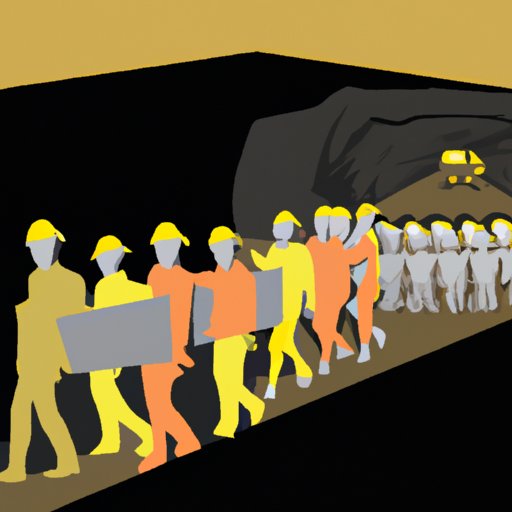Introduction
Mining is the practice of extracting valuable minerals and other materials from the earth. It has been a major part of human history since the beginning of civilization, with some of the earliest known evidence of mining dating back to 4000 BC. Today, mining is an important industry in many countries around the world, with miners playing a critical role in providing resources for a variety of industries.
Exploring the Role of Miners in Modern Society
The role of miners in modern society is complex and varied. On one hand, miners provide essential resources for a variety of industries, including construction, manufacturing, and energy production. On the other hand, mining can also have significant environmental and social impacts, from air and water pollution to displacement of local communities.
Types of Mining Occupations
Mining occupations can be divided into two broad categories: surface mining and underground mining. Surface mining involves extracting minerals and other materials from the earth’s surface, often using heavy machinery such as bulldozers, excavators, and dump trucks. Underground mining involves digging tunnels and shafts into the earth in order to access deposits of minerals and other materials. Each type of mining requires different skills and equipment, and miners may specialize in one or both types of mining.

The Benefits and Risks of Mining for Communities and the Environment
Mining can bring both economic benefits and environmental risks to local communities and the wider environment. For example, it can provide much-needed jobs and income for people in economically disadvantaged areas, while also generating revenue for governments. However, it can also cause environmental damage through air and water pollution, land degradation, and displacement of local communities.
What Do Miners Do? An Overview of Mining Occupations
Mining occupations involve a range of activities, from surveying and drilling to operating mining machinery and managing mining operations. Some common mining occupations include:
- Surveyors: Surveyors measure the land and locate mineral deposits.
- Drillers: Drillers operate drills to create tunnels and shafts for underground mining.
- Heavy Equipment Operators: Heavy equipment operators use bulldozers, excavators, and other machinery to extract minerals from the earth.
- Engineers: Engineers design and implement mining operations.
- Geologists: Geologists study rocks and minerals to identify potential mining sites.
- Supervisors and Managers: Supervisors and managers oversee mining operations.
In addition to these occupations, miners may also work in related roles such as safety inspectors, environmental protection officers, and truck drivers.
Job Duties and Responsibilities
Miners are responsible for a variety of tasks, depending on their role. For example, surveyors must measure land and identify potential mineral deposits, while drillers must operate drills and set explosive charges in order to create tunnels and shafts. Heavy equipment operators must operate bulldozers, excavators, and other machinery in order to extract minerals. Engineers must design and implement mining operations, while geologists must study rocks and minerals to identify potential mining sites. Supervisors and managers must oversee the day-to-day operations of the mine.

The Future of Mining: Innovations and Trends in the Industry
The mining industry is constantly evolving, with new technologies and innovations being developed to improve efficiency and safety. Some of the most exciting developments in the industry include:
- Technological Advances in Mining: Automation and robotics are increasingly being used in mining operations, allowing miners to work more efficiently and safely.
- Mining Safety Improvements: New safety protocols and technologies are being developed to reduce the risk of accidents and injuries in mines.
- Environmental Sustainability Initiatives: Companies are investing in renewable energy sources and sustainable practices to reduce their environmental impact.
Conclusion
Mining has been an integral part of human history since the beginning of civilization, and the role of miners in modern society is complex and varied. Mining occupations involve a range of activities, from surveying and drilling to operating mining machinery and managing mining operations. The mining industry is constantly evolving, with technological advances, safety improvements, and environmental sustainability initiatives leading the way. As the industry continues to evolve, miners will play an ever-important role in providing resources for a variety of industries.
In summary, miners play a vital role in providing resources for modern society, and the industry is constantly evolving with technological advances, safety improvements, and environmental sustainability initiatives. As the industry continues to grow, miners will remain an integral part of human progress.
(Note: Is this article not meeting your expectations? Do you have knowledge or insights to share? Unlock new opportunities and expand your reach by joining our authors team. Click Registration to join us and share your expertise with our readers.)
